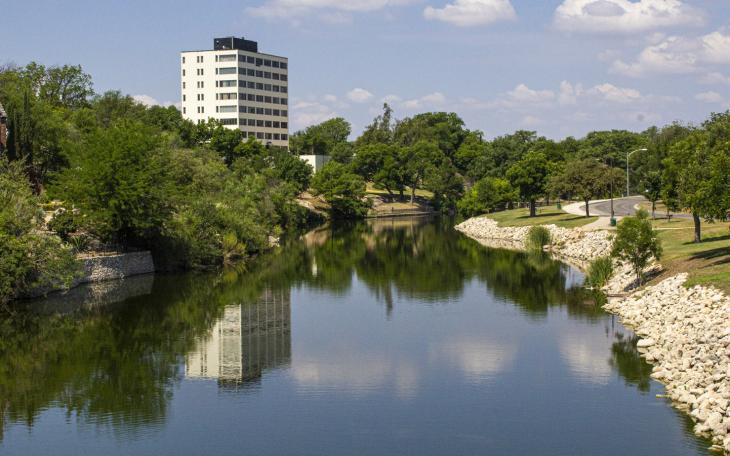AUSTIN, TX — Storms and flooding that hurt oyster production on Texas coasts will lead to a limited opening of commercial and recreational public oyster harvest areas during the upcoming season, Nov. 1-April 30.
Due to sampling surveys that identified oyster reefs with low abundances of market-sized oysters, Texas Parks and Wildlife Department will open 10 of 28 shellfish harvest areas to fishing at the beginning of this season.
“Oysters form an important habitat that provides many ecosystem services as well as a fisheries resources, and the Texas Parks and Wildlife Department (TPWD) is working hard to balance the protection and restoration of wild oysters with the needs of the commercial oyster industry,” said TPWD Executive Director David Yoskowitz, Ph.D. “The department is increasing restoration efforts, closely monitoring reefs and taking prompt action if overfishing occurs and streamlining programs, like cultivated oyster mariculture. For this year, our sampling data shows that wild oysters are still at low abundances and struggling.”
Prior to the start of the season, TPWD conducted targeted sampling in each oyster area to assess the abundance of market-sized oysters. The areas that mopening threshold abundance are set to open for the upcoming oyster harvest season on Nov. 1.
TPWD also considered the need to distribute commercial oyster fleets over larger geographical areas to prevent over-harvest. To accomplish this in the 2024-2025 season, the department will open three additional harvest areas that contain reefs with a relatively high abundance of market-sized oysters, along with reefs of lower abundance. These areas do not meet the traditional abundance metrics to open, but because there are reefs with enough market-sized oysters to support harvest and a need to distribute the fleet across a broader geographical area, the department has opened these areas and will monitor them closely for signs of over harvest. The remaining shellfish harvest areas that do not meet previously stated metrics of market-sized oyster populations will be closed at the start of the season and be closely monitored in-season, should they meet the threshold for opening.
Galveston Bay has historically been a large source of commercial oyster harvest. However, oyster populations in Galveston Bay currently present low oyster abundance, as reflected in TPWD’s sampling data.
“We had hoped for better oyster abundance numbers that would’ve allowed for more areas to be open this season,” said Robin Riechers, director of TPWD’s Coastal Fisheries Division. “Unfortunately, tropical storm Alberto and Hurricane Beryl caused high amounts of freshwater inflow into the Galveston Bay system, which resulted in considerable oyster mortality in Texas’ bays. We will continue to pursue oyster restoration efforts to hopefully allow our wild oyster population abundances the chance to increase in both for commercial purposes as well as for the numerous ecological benefits oysters provide.”
Oysters benefit the environment in various ways, including:
- Providing essential habitat for fish and invertebrates
- Protecting against erosion by buffering wave action and storm surge
- Enhancing water quality by serving as a filter for water in the bays
Closing areas to harvest helps preserve and replenish these ecosystem services. To facilitate reef recovery, TPWD will continue to sample open shellfish harvest areas and close zones that drop below recommended metrics.
A map showing the shellfish harvest areas can be found on the Department of State Health Services (DSHS) website. The list below does not reflect harvest area closures for public health. Please visit the DSHS website for the latest information.
Texas Parks and Wildlife code allows for the emergency closure of reefs to oyster harvest when evidence shows they are being overworked. These closings are based on samples collected by TPWD showing low catch rates of legal-sized, harvestable oysters.
Of the 28 shellfish harvest areas along the Texas coast, 10 will be open at the start of the public oyster season.
Shellfish Harvesting Areas Open for Public Harvest Beginning Nov. 1:
• Galveston Bay:
- TX-2
- TX-4
- TX-8
• Matagorda Bay:
- TX-19
- TX-20
• San Antonio Bay:
- TX-26
• Aransas Bay:
- TX-29
- TX-30
• Corpus Christi Bay:
- TX-33
• Laguna Madre Bay:
- TX-34
Note: TX areas 2, 4, 8, 33, and 34 were not sampled due to typically minimal or no harvest. All TX areas not sampled before the season will open on Nov. 1 by default.
Shellfish Harvesting Areas Closed for Public Harvest Beginning Nov. 1:
• Galveston Bay:
- TX-1
- TX-3
- TX-5
- TX-6
- TX-7
- TX-9
• Matagorda Bay:
- TX-11
- TX-12
- TX-14
- TX-15
- TX-16
- TX-18
- TX-21
• San Antonio Bay:
- TX-24
- TX-25
- TX-27
• Aransas Bay:
- TX-28 Closed by TPW Commission on Nov. 8, 2022
- TX-32
For more information about oysters and how they benefit the environment, TPWD’s oyster restoration efforts and the growing Cultivated Oyster Mariculture program, be sure to check out the November Issue of the TPWD Magazine, which includes the feature story: Oysters on the Edge.
Subscribe to the LIVE! Daily
Required






Post a comment to this article here: